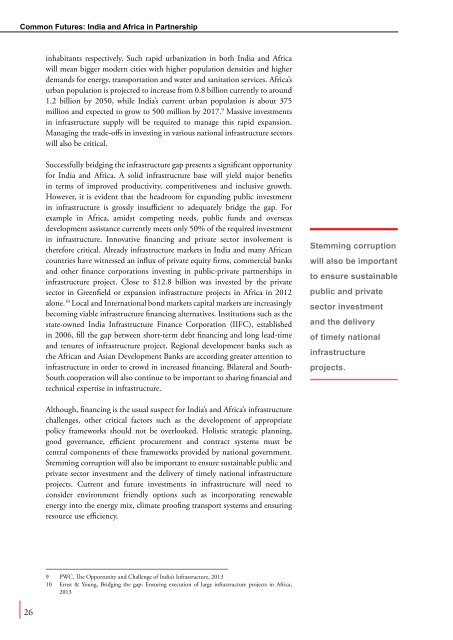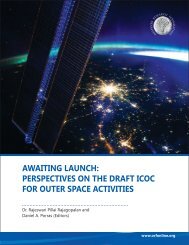Common Futures
II3UUw
II3UUw
You also want an ePaper? Increase the reach of your titles
YUMPU automatically turns print PDFs into web optimized ePapers that Google loves.
<strong>Common</strong> <strong>Futures</strong>: India and Africa in Partnership<br />
inhabitants respectively. Such rapid urbanization in both India and Africa<br />
will mean bigger modern cities with higher population densities and higher<br />
demands for energy, transportation and water and sanitation services. Africa’s<br />
urban population is projected to increase from 0.8 billion currently to around<br />
1.2 billion by 2050, while India’s current urban population is about 375<br />
million and expected to grow to 500 million by 2017. 9 Massive investments<br />
in infrastructure supply will be required to manage this rapid expansion.<br />
Managing the trade-offs in investing in various national infrastructure sectors<br />
will also be critical.<br />
Successfully bridging the infrastructure gap presents a significant opportunity<br />
for India and Africa. A solid infrastructure base will yield major benefits<br />
in terms of improved productivity, competitiveness and inclusive growth.<br />
However, it is evident that the headroom for expanding public investment<br />
in infrastructure is grossly insufficient to adequately bridge the gap. For<br />
example in Africa, amidst competing needs, public funds and overseas<br />
development assistance currently meets only 50% of the required investment<br />
in infrastructure. Innovative financing and private sector involvement is<br />
therefore critical. Already infrastructure markets in India and many African<br />
countries have witnessed an influx of private equity firms, commercial banks<br />
and other finance corporations investing in public-private partnerships in<br />
infrastructure project. Close to $12.8 billion was invested by the private<br />
sector in Greenfield or expansion infrastructure projects in Africa in 2012<br />
alone. 10 Local and International bond markets capital markets are increasingly<br />
becoming viable infrastructure financing alternatives. Institutions such as the<br />
state-owned India Infrastructure Finance Corporation (IIFC), established<br />
in 2006, fill the gap between short-term debt financing and long lead-time<br />
and tenures of infrastructure project. Regional development banks such as<br />
the African and Asian Development Banks are according greater attention to<br />
infrastructure in order to crowd in increased financing. Bilateral and South-<br />
South cooperation will also continue to be important to sharing financial and<br />
technical expertise in infrastructure.<br />
Stemming corruption<br />
will also be important<br />
to ensure sustainable<br />
public and private<br />
sector investment<br />
and the delivery<br />
of timely national<br />
infrastructure<br />
projects.<br />
Although, financing is the usual suspect for India’s and Africa’s infrastructure<br />
challenges, other critical factors such as the development of appropriate<br />
policy frameworks should not be overlooked. Holistic strategic planning,<br />
good governance, efficient procurement and contract systems must be<br />
central components of these frameworks provided by national government.<br />
Stemming corruption will also be important to ensure sustainable public and<br />
private sector investment and the delivery of timely national infrastructure<br />
projects. Current and future investments in infrastructure will need to<br />
consider environment friendly options such as incorporating renewable<br />
energy into the energy mix, climate proofing transport systems and ensuring<br />
resource use efficiency.<br />
9 PWC. The Opportunity and Challenge of India’s Infrastructure, 2013<br />
10 Ernst & Young, Bridging the gap: Ensuring execution of large infrastructure projects in Africa,<br />
2013<br />
26








